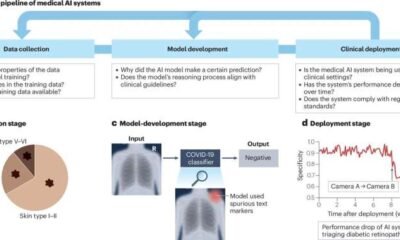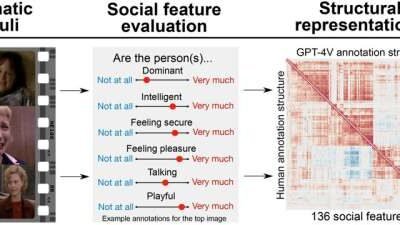AI Research
Study sheds light on hurdles faced in transforming NHS health care with AI

Implementing artificial intelligence (AI) into NHS hospitals is far harder than initially anticipated, with complications around governance, contracts, data collection, harmonization with old IT systems, finding the right AI tools and staff training, finds a major new UK study led by UCL researchers.
Authors of the study, published in eClinicalMedicine, say the findings should provide timely and useful learning for the UK Government, whose recent 10-year NHS plan identifies digital transformation, including AI, as a key platform to improving the service and patient experience.
In 2023, NHS England launched a program to introduce AI to help diagnose chest conditions, including lung cancer, across 66 NHS hospital trusts in England.
The trusts are grouped into 12 imaging diagnostic networks: these hospital networks mean more patients have access to specialist opinions. Key functions of these AI tools included prioritizing critical cases for specialist review and supporting specialists’ decisions by highlighting abnormalities on scans.
The research was conducted by a team from UCL, the Nuffield Trust, and the University of Cambridge, analyzing how procurement and early deployment of the AI tools went. The study is one of the first studies to analyze real-world implementation of AI in health care.
Evidence from previous studies, mostly laboratory-based, suggested that AI might benefit diagnostic services by supporting decisions, improving detection accuracy, reducing errors and easing workforce burdens.
In this UCL-led study, the researchers reviewed how the new diagnostic tools were procured and set up through interviews with hospital staff and AI suppliers, identifying any pitfalls but also any factors that helped smooth the process.
They found that setting up the AI tools took longer than anticipated by the program’s leadership. Contracting took between four and 10 months longer than anticipated and by June 2025, 18 months after contracting was meant to be completed, one-third (23 out of 66) of the hospital trusts were not yet using the tools in clinical practice.
Key challenges included engaging clinical staff with already high workloads in the project, embedding the new technology in aging and varied NHS IT systems across dozens of hospitals and a general lack of understanding, and skepticism, among staff about using AI in health care.
The study also identified important factors which helped embed AI, including national program leadership and local imaging networks sharing resources and expertise, high levels of commitment from hospital staff leading implementation, and dedicated project management.
The researchers concluded that while “AI tools may offer valuable support for diagnostic services, they may not address current health care service pressures as straightforwardly as policymakers may hope” and are recommending that NHS staff are trained in how AI can be used effectively and safely and that dedicated project management is used to implement schemes like this in the future.
First author Dr. Angus Ramsay (UCL Department of Behavioral Science and Health) said, “In July ministers unveiled the Government’s 10-year plan for the NHS, of which a digital transformation is a key platform.
“Our study provides important lessons that should help strengthen future approaches to implementing AI in the NHS.
“We found it took longer to introduce the new AI tools in this program than those leading the program had expected.
“A key problem was that clinical staff were already very busy—finding time to go through the selection process was a challenge, as was supporting integration of AI with local IT systems and obtaining local governance approvals. Services that used dedicated project managers found their support very helpful in implementing changes, but only some services were able to do this.
“Also, a common issue was the novelty of AI, suggesting a need for more guidance and education on AI and its implementation.
“AI tools can offer valuable support for diagnostic services, but they may not address current health care service pressures as simply as policymakers may hope.”
The researchers conducted their evaluation between March and September last year, studying 10 of the participating networks and focusing in depth on six NHS trusts. They interviewed network teams, trust staff and AI suppliers, observed planning, governance and training and analyzed relevant documents.
Some of the imaging networks and many of the hospital trusts within them were new to procuring and working with AI.
The problems involved in setting up the new tools varied—for example, in some cases, those procuring the tools were overwhelmed by a huge amount of very technical information, increasing the likelihood of key details being missed. Consideration should be given to creating a national approved shortlist of potential suppliers to facilitate procurement at local level, the researchers said.
Another problem was initial lack of enthusiasm among some NHS staff for the new technology in this early phase, with some more senior clinical staff raising concerns about the potential impact of AI making decisions without clinical input and on where accountability lay in the event a condition was missed.
The researchers found the training offered to staff did not address these issues sufficiently across the wider workforce—hence their call for early and ongoing training on future projects.
In contrast, however, the study team found the process of procurement was supported by advice from the national team and imaging networks learning from each other.
The researchers also observed high levels of commitment and collaboration between local hospital teams (including clinicians and IT) working with AI supplier teams to progress implementation within hospitals.
Senior author Professor Naomi Fulop (UCL Department of Behavioral Science and Health) said, “In this project, each hospital selected AI tools for different reasons, such as focusing on X-ray or CT scanning, and purposes, such as to prioritize urgent cases for review or to identify potential symptoms.
“The NHS is made up of hundreds of organizations with different clinical requirements and different IT systems and introducing any diagnostic tools that suit multiple hospitals is highly complex. These findings indicate AI might not be the silver bullet some have hoped for but the lessons from this study will help the NHS implement AI tools more effectively.”
While the study has added to the very limited body of evidence on the implementation and use of AI in real-world settings, it focused on procurement and early deployment. The researchers are now studying the use of AI tools following early deployment when they have had a chance to become more embedded.
Further, the researchers did not interview patients and caregivers and are therefore now conducting such interviews to address important gaps in knowledge about patient experiences and perspectives, as well as considerations of equity.
More information:
Procurement and early deployment of artificial intelligence tools for chest diagnostics in NHS services in England: A rapid, mixed method evaluation, eClinicalMedicine (2025). DOI: 10.1016/j.eclinm.2025.103481
Citation:
Study sheds light on hurdles faced in transforming NHS health care with AI (2025, September 10)
retrieved 10 September 2025
from https://medicalxpress.com/news/2025-09-hurdles-nhs-health-ai.html
This document is subject to copyright. Apart from any fair dealing for the purpose of private study or research, no
part may be reproduced without the written permission. The content is provided for information purposes only.
AI Research
Nebius Raises $3.7 Billion in Wake of Microsoft AI Deal

Dutch cloud computing company Nebius has raised $3.75 million via sales of stock and convertible notes.
AI Research
Artificial Intelligence Stocks Rally as Nvidia, TSMC Gain on Oracle Growth Forecast

This article first appeared on GuruFocus.
Sep 11 – Oracle (ORCL, Financial) projected its cloud infrastructure revenue will surge to $114 billion by fiscal 2030, a forecast that triggered strong gains across artificial intelligence-related stocks.
The company also outlined plans to spend $35 billion in capital expenditures by fiscal 2026 to expand its data center capacity.
Shares of Oracle soared 36% on Wednesday on the outlook, as investors bet on rising demand for GPU-based cloud services. Nvidia (NASDAQ:NVDA), which supplies most of the chips and systems for AI data centers, climbed 4%. Broadcom (NASDAQ:AVGO), a key networking and custom chip supplier, gained 10%.
Other chipmakers also advanced. Advanced Micro Devices (AMD,) added 2%, while Micron Technology (MU, Financial) increased 4% on expectations for higher memory demand in AI servers. Taiwan Semiconductor Manufacturing Co. (NYSE:TSM), which produces chips for Nvidia and other AI players, rose more than 4% after reporting a 34% jump in August sales.
Server makers Super Micro Computer (SMCI, Financial) and Dell Technologies (DELL) each rose 2%, supported by their role in assembling Nvidia-powered systems. CoreWeave (CRWV), an Oracle rival in the neo-cloud segment, advanced 17% as investors continued to bet on accelerating AI compute demand.
AI Research
Oracle Health Deploys AI to Tackle $200B Administrative Challenge

Oracle Health introduced tools aimed at easing administrative healthcare burdens and costs.
-

 Business2 weeks ago
Business2 weeks agoThe Guardian view on Trump and the Fed: independence is no substitute for accountability | Editorial
-
Tools & Platforms1 month ago
Building Trust in Military AI Starts with Opening the Black Box – War on the Rocks
-

 Ethics & Policy2 months ago
Ethics & Policy2 months agoSDAIA Supports Saudi Arabia’s Leadership in Shaping Global AI Ethics, Policy, and Research – وكالة الأنباء السعودية
-

 Events & Conferences4 months ago
Events & Conferences4 months agoJourney to 1000 models: Scaling Instagram’s recommendation system
-

 Jobs & Careers2 months ago
Jobs & Careers2 months agoMumbai-based Perplexity Alternative Has 60k+ Users Without Funding
-

 Podcasts & Talks2 months ago
Podcasts & Talks2 months agoHappy 4th of July! 🎆 Made with Veo 3 in Gemini
-

 Education2 months ago
Education2 months agoMacron says UK and France have duty to tackle illegal migration ‘with humanity, solidarity and firmness’ – UK politics live | Politics
-

 Education2 months ago
Education2 months agoVEX Robotics launches AI-powered classroom robotics system
-

 Funding & Business2 months ago
Funding & Business2 months agoKayak and Expedia race to build AI travel agents that turn social posts into itineraries
-

 Podcasts & Talks2 months ago
Podcasts & Talks2 months agoOpenAI 🤝 @teamganassi





















